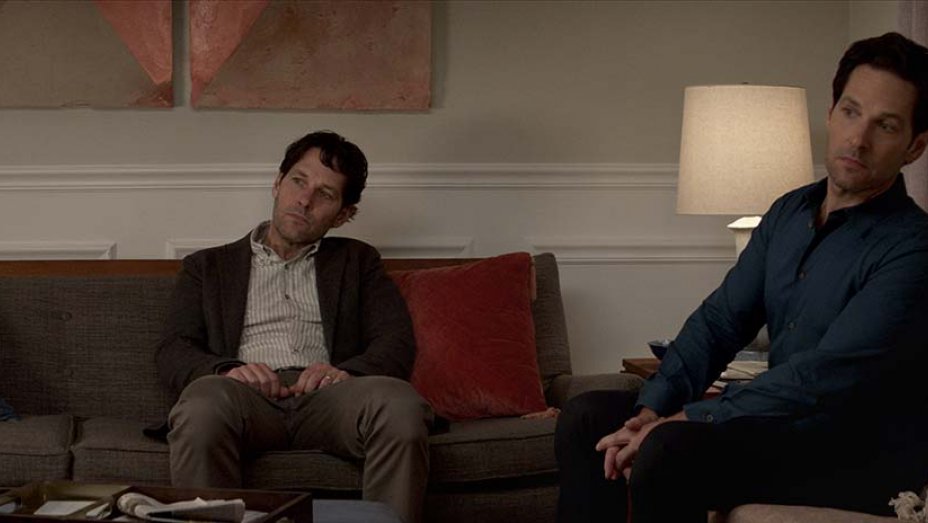Photo courtesy of The Hollywood Reporter.
MARISSA WEINER | OPINION COLUMNIST | mnweiner@butler.edu
The ageless Paul Rudd joins a storied list of actors, such as Lindsay Lohan, playing double in Netflix’s new series, “Living With Yourself.” In the series, Rudd plays both lead roles.
The series, released on Oct. 18, tells the story of Miles, a copywriter who struggles to find fulfillment in his job and marriage. Desperate to become a better version of himself, Miles attends a wellness spa located in a strip mall. His life-changing procedure is unsurprisingly mismanaged, and Miles is cloned. Cue “Miles Two,” as I’ll call him.
Both Miles and Miles Two share identical memories and features. The only thing differentiating the two physically is the appendectomy scar that Miles sports across his stomach. Emotionally and mentally, however, Miles Two is the “better version” of Miles: he’s positive, successful at work and an excellent partner and friend.
Of course, both men are in love with Miles’ wife, Kate. That’s where most of the series’ drama lies.
While Miles Two goes to work in Miles’ place, Miles stays at home, writing the screenplay he’s always dreamed of finishing. Without a nine-to-five job, Miles is satisfied with his new free time. However, once Miles Two returns from work, drama ensues: the men compete for who gets to spend the night with Kate.
The premise is silly. Despite its eccentricity, though, the Netflix original is believable. What wouldn’t one do for constant happiness? In today’s society, self-improvement is highly sought after; there’s been a recent push for holistic health, promoting the constant balance between one’s physical and mental health. “Living With Yourself” is timely in that in questions just how far one would go to better themselves.
Though the program is categorized as a comedy, I never found myself laughing aloud. It’s incredibly dark, tackling issues like self-loathing, infertility, depression, suicide and failing relationships. It’s surprising to see Paul Rudd, Ant-Man, acting in such a serious role. It’s refreshing. Casting an actor known primarily for his comedic chops in not only one, but two dramatic roles was wise; it attracts viewers with its novelty, allowing for a larger audience. An actor with less recognition who lacks a fan base wouldn’t bring as much attention to the aforementioned themes that are ever so important today. Additionally, seeing Rudd’s character struggle with issues untypical to other characters he has played forces audiences to confront that even the happiest people we know could be struggling.
The series includes eight episodes, each of about 30 minutes. Despite each episode’s brevity, “Living With Yourself” isn’t binge-worthy. And, I don’t think it was ever meant to be. The show functions as if it was released pre-streaming services, in which you’d have to wait a week for a new episode to be released. At the beginning of each episode, the previous episode is “summarized.” I place the word in quotations, as it’s not much of a summary at all — it lasts nearly five minutes, and is a complete waste of space, especially in today’s binge-watching culture.
Other than its lengthy summaries, “Living With Yourself” is incredibly well done. After the cloning, I constantly found myself questioning my allegiance to each character. Do I feel sorry for Miles Two, who didn’t ask to join this world where he has no place? Or, do I feel sorry for Miles, whose severe depression drove him to surgically improve himself? That’s what the show does best: allowing viewers the opportunity to side with one of the Miles for an episode or two, then completely flipping their perspective.
“Living With Yourself” is worth watching. It dabbles in three genres: drama, science fiction and comedy, so there’s elements in the show for any viewer. It features double Rudd and has an ensemble of other great actors and actresses under the lead of acclaimed directors. Most of all, though, “Living With Yourself” forces viewers to self-reflect, acknowledging that both the good and the bad parts of yourself are needed to make yourself whole. The facets of your personality and your life that you want so badly to disappear will always remain as a part of your identity. Even after becoming the best version of yourself, your appendectomy scar remains.



